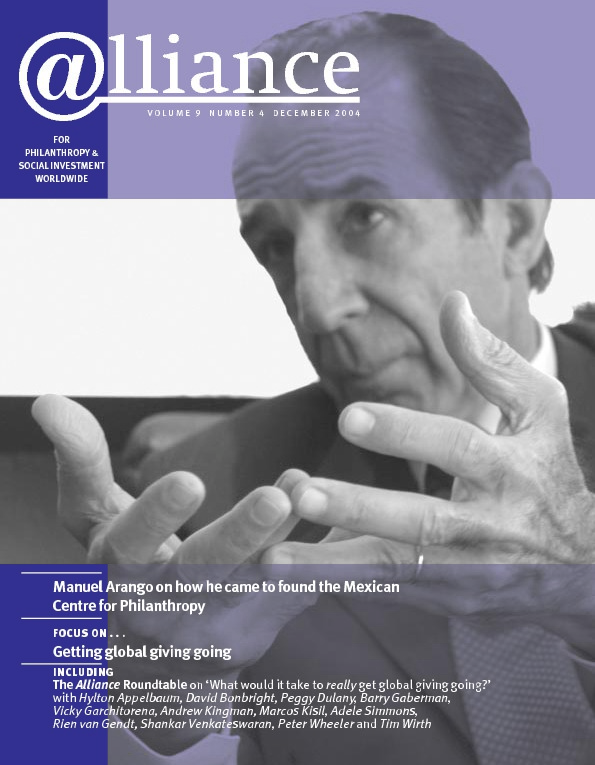A series of recently conducted studies have confirmed that the potential of philanthropy for social development is huge across the globe, yet in many countries very little of it currently comes to non-profit organizations (NPOs) for social development purposes. How can the sector increase its share of the pie? Greater ‘downward’ accountability to its constituency might be one way.
An Aga Khan Development Network (AKDN) study estimated the volume of individual indigenous philanthropy in Pakistan at US$1.5 billion per year.[1] Similarly, the research conducted by the Centre for Development Services, Cairo shows that Egyptians gave about $1 billion in 2003 for charitable causes.[2] In both cases, however, the bulk of it goes either to individuals – in Pakistan’s case, 65 per cent – such as neighbours, relatives in need and beggars, or to religious organizations. If NPOs want to persuade philanthropists that they are an effective vehicle for their giving, the most fundamental step is to become more accountable to both internal and external stakeholders.
The ‘age of accountability’
A series of high-profile scandals in the non-profit sector, almost exponential growth in its size and scope in the recent years, the sometimes political undertones of advocacy groups, and the general drive for increased public scrutiny in all spheres have resulted in ever louder calls for public disclosure of information, transparency, propriety, efficiency and effectiveness. As Kumi Naidoo puts it, the age of ‘blind faith’ in institutions is over: we have entered the ‘age of accountability’.[3]
NPOs survive on voluntary contributions. International aid agencies, national and international corporate entities, diaspora communities and individual philanthropists increasingly demand that their contributions be both used to best advantage and put to the use for which they were intended. If NPOs don’t do this, the contributions will cease. The recent development of an NGO certification system by the Pakistan Centre for Philanthropy and the adoption of codes of conduct by various nationwide NPO networks in Pakistan can be seen as a direct response to these demands.
Accountability to whom?
But NPO accountability is complicated by the range of their stakeholders. There is accountability to powerful stakeholders like boards, governments and donors. Most organizations would normally report their programme and financial performance to them and comply with conditions imposed by them either because these stakeholders are directly a source of funding or because they are otherwise instrumental in resource generation.
Then there are ‘weak’ stakeholders like beneficiaries, local communities, employees and the public at large, who are seldom consulted in project design, development and evaluation. For example, very few organizations in Pakistan place their income and expenditure statements on their websites or in their annual reports. Even fewer would present such information in their communication with local communities. For the most part, these stakeholders are kept out of the loop and consulted only when the powerful stakeholders need them.
The importance of ‘weak’ stakeholders
This is a strategic mistake. Only a small proportion of NPO resources come from the government and the international aid agencies – in Pakistan’s case 5.8 per cent and 6.5 per cent respectively – and boards are seldom a direct source of funding. That being the case, accountability to these stakeholders alone does not help much in resource generation. The bulk of NPO revenues comes from fees, membership dues and individual contributions. This is where members, staff and local communities play a key role. NPOs need to understand that, while the trust and confidence of governments and donors is important, ‘downward’ accountability to other stakeholders is critical to securing their support and commitment.
This is not just a matter of strategy. After all, it is the beneficiary communities who are the raison d’être of the non-profits. If they are not accountable to them and do not actively engage them in decision-making, NPOs are failing in their mission.
The fundamental challenge for non-profit organizations is to develop local sources of sustained funding. To do this, they need to establish a positive relationship with local opinion. Can they do this without opening up, without publicly disclosing their sources of funding and major expenditure heads, and without actively engaging all stakeholders in decision-making processes? Hardly anybody would say, yes.
1 Aga Khan Development Network (2000) Philanthropy in Pakistan: A report of the Initiative on Indigenous Philanthropy Islamabad, Pakistan.
2 The report is currently in process of publication.
3 Kumi Naidoo (2003) Civil Society Accountability: ‘Who Guards the Guardians?’ CIVICUS.
Mohammad Ahsan Rana is Senior Programme Manager for Certification at the Pakistan Centre for Philanthropy. He can be contacted at Ahsan.Rana@pcp.org.pk





Comments (0)